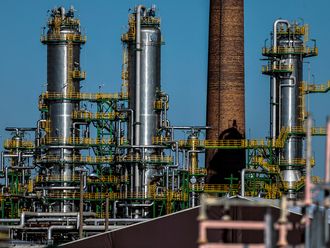This has been a rollercoaster of a year for the global capital markets. Even observers have been hanging on to their seats and for participants it has been more nerve-wracking still.
As the year draws to a close, it is clear that the bumpy journey will continue into 2010. But difficult as 2009 has been, there is much to be thankful for. The meltdown of the world's financial system that looked possible at the end of 2008 and beginning of this year was averted. There was an upturn over the year in global IPO activity and bond issuance, share price volatility in the US decreased and most of the world's large economies started to expand again.
A highlight of the year was the success of the $700 billion (Dh2.5 trillion) Troubled Asset Relief Programme (Tarp) in the United States. Passed in a hurry by Congress in October 2008, the month after Lehman Brothers went bankrupt, Tarp was an emergency measure designed to prevent a collapse of the banking system. In early 2009 its success was far from assured; the newly inaugurated President Obama warned in February that the amount of the programme might need to be doubled. But Tarp, combined with other measures, has done its job so well that several recipients of its capital, such as Goldman Sachs and Bank of America, have been able to repay it.
Tarp played crucial role
This month Timothy Geithner, the Treasury Secretary, said he expects $175 billion to be returned by the end of next year. True, Tarp contributed to a US budget deficit in fiscal 2009 of a dizzying 9 per cent of GDP, and this hole will have to be plugged in future years. But it played a crucial role at the right time in staving off immediate crisis.
Another welcome sign was a partial revival of the global market for initial public offerings (IPOs). In Europe, IPOs raised $2.6 billion in the third quarter of this year, nearly three times as much as in the second quarter and slightly more than in the third quarter of last year. The US market also improved, with IPOs raising $5.8 billion in the third quarter of this year, more than four times the amount raised in the same period of 2008.
An interesting feature of the IPO market these days is the clear preference of companies in emerging markets to list in their own region, rather than in the US or London. Just 13 of the 134 Chinese IPOs this year listed in the US, while none of India's 15 listings did so, and only one of five by Brazilian companies. This trend reflects both the growing wealth of emerging markets and the increasing maturity of their capital markets structures. The bond market also had a remarkably strong year, with a record high of more than $1 trillion of investment grade corporate debt sold this year.
‘Fear' index
Market expectations of US share price volatility meanwhile experienced a welcome decline, as measured by the Chicago Board Options Exchange Volatility Index (VIX), sometimes known as the ‘fear' index. VIX fell from 80 in November 2008 to 57 in January this year and 22 at the time of writing, close to its historical average. A lower number implies widespread confidence in market stability.
The economies of the US, Germany and France began to expand again this year, while China and India grew strongly. The UK, still in recession, is a notable exception among major economies.
Despite much good news in 2009, many hazards lie ahead. One structural issue that needs to be resolved is that relative spending by the public and private sectors has been thrown out of balance in the past year, with governments playing a far larger role than before. Equilibrium needs to be restored, so that the private sector can again act as the world's engine of growth, innovation and job creation, activities which it is far better at in the long term than governments are.
The vast public sector debts that need to be paid off will act as a drag on the private sector's growth. It is therefore crucial that the private sector, and the investors who support it, keep their nerve. They must continue to create wealth by putting capital into sound ventures and keeping faith with established companies whose long term prospects are good. If they do, then I believe that the global recovery that began in 2009 will continue next year.
The columnist is chief executive, Nasdaq Dubai. Views expressed here are his own.












